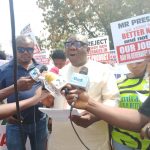Corruption and Economic Sabotage: Can Transparency Save Nigeria from Its Governance Crisis?
By Dr. Aiyeku Olufemi Samuel
Co-Founder & Lead Consultant, Global Human Capital & Energy Management Limited
Governance Analyst | Development Economist | Policy Consultant | Strategic Development Advocate | Climate Action Enthusiast | Sustainability & Impact Investing Specialist | Girl-Child Advocacy | PPP & CRM Specialist
“Corruption is paid by the poor.”
— Pope Francis
Corruption is not just a moral failure; it is an economic cancer. In Nigeria, this cancer has metastasized into every fiber of the national fabric—bleeding the economy, sabotaging public trust, killing opportunity, and hollowing out institutions from within.
But here’s the question that looms large over our national conscience:
Can transparency alone rescue Nigeria from its governance crisis, or are we merely treating symptoms without addressing the rot?
The Alarming Cost of Corruption
According to the Nigerian Economic Summit Group (NESG) and PricewaterhouseCoopers (PwC), Nigeria loses an estimated \$18 billion annually to corruption. That is more than our combined budgets for education, health, and infrastructure. Imagine the millions of children who could go to school, the lives that could be saved with quality healthcare, or the roads and power systems we could build with just a fraction of that lost wealth.
The United Nations Office on Drugs and Crime (UNODC) further states that over 32% of Nigerians have paid a bribe to public officials in the past year. Is this the society we aspire to be—where survival is negotiated and justice is auctioned?
Who really pays the price?
Not the corrupt elite with offshore accounts, but the farmer whose road is never built. The young graduate whose employment is postponed indefinitely. The patient who dies waiting for drugs that were never procured. Corruption is not an abstract crime—it is a life-shortening injustice.
Governance in Crisis: A Failure of Trust
When public institutions lose legitimacy, governance collapses into dysfunction. Nigeria’s public procurement system, tax administration, oil sector, and security agencies are frequently cited in corruption cases. According to Transparency International’s 2023 Corruption Perception Index, Nigeria ranked 145th out of 180 countries, scoring just 25 out of 100.
This is not just a poor score. It is a public indictment.
When leadership is seen as an opportunity to loot rather than serve, when public offices become private business ventures, and when whistleblowers are punished while looters are celebrated—is it any wonder that national progress feels like a myth?
Transparency: The Antidote or the Beginning?
Can transparency save Nigeria? The answer is yes—but not alone.
Transparency is the beginning of accountability, not its end. A transparent government is one that welcomes scrutiny, publishes data, makes public budgets accessible, tracks public procurement, and encourages citizen feedback.
However, transparency without consequences is merely performance. Nigeria has passed several anti-corruption laws, established agencies like the EFCC, ICPC, Code of Conduct Bureau, and Public Complaints Commission—yet, convictions remain rare, and political interference is rampant.
What then must we do?
A Roadmap for Real Reform
• Digitize Governance Systems
The more digital and automated public systems are, the less room there is for human manipulation. E-governance reduces rent-seeking and strengthens audit trails.
• Protect Whistleblowers
Citizens who expose corruption must be shielded, not punished. Nigeria’s whistleblower policy must be legislated and improved, not just politicized.
• Decentralize Oversight
Local governments, civil society, and the media must be empowered to monitor budgets and projects from the grassroots. True change is community-led, not Abuja-centered.
• Asset Recovery and Transparency
Publicly list and account for all recovered assets. Who took what? What was recovered? How is it being used? Silence breeds suspicion.
• Judicial Reforms
No anti-corruption effort can succeed without an efficient, independent, and incorruptible judiciary. Fast-track courts for economic crimes should be established, and judges insulated from political control.
• Ethical Leadership Development
We must stop producing career politicians and start nurturing servant leaders—men and women with competence, character, and conscience.
Rhetorical Pause: Who Will Save Nigeria?
Is it the government? The courts? The international community?
No. The responsibility is ours—yours and mine. Change is not delegated. It is demanded. As citizens, our silence enables impunity. Our votes empower corruption. Our apathy sustains injustice.
As the great Chinua Achebe once wrote, “The trouble with Nigeria is simply and squarely a failure of leadership.” But it is also a failure of followership—when we stop asking questions, when we normalize evil, and when we forget that patriotism is about accountability.
Youth: Nigeria’s Last Hope?
Nigeria’s youth—over 70% of the population—are uniquely positioned to break this cycle. But are they ready?
Are our youth building solutions or seeking shortcuts?
Are they the new vanguard of ethical governance or new enablers of political thuggery?
We must organize, mobilize, educate, innovate, and hold accountable. From digital activism to policy advocacy, from community audits to ethical startups—young Nigerians must choose impact over indifference.
A Final Word: The Time to Act Is Now
In the words of Barack Obama, “Africa doesn’t need strong men. It needs strong institutions.” Nigeria’s institutions will not become strong overnight. But with transparency, courage, citizen engagement, and youth-led innovation, they can begin to heal.
Corruption thrives in darkness. Let us be the light.
Because transparency is not a strategy—it is a lifeline.
Dr. Aiyeku Olufemi Samuel
Governance Analyst | Development Economist | Policy Consultant
Co-Founder & Lead Consultant,
Global Human Capital & Energy Management Limited
aiyekuolufemi@gmail.com
0802 545 1262 |0803 786 6085












